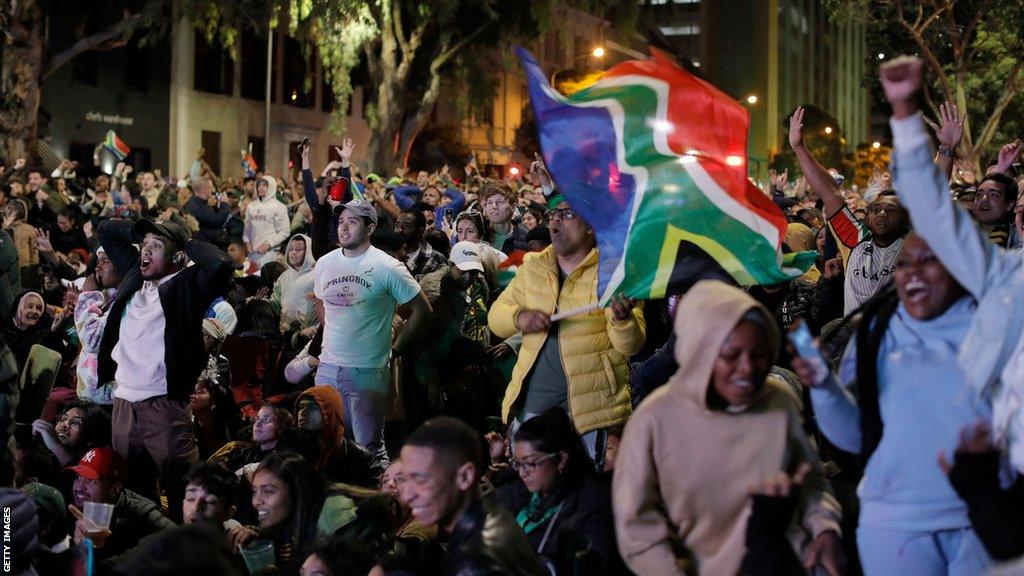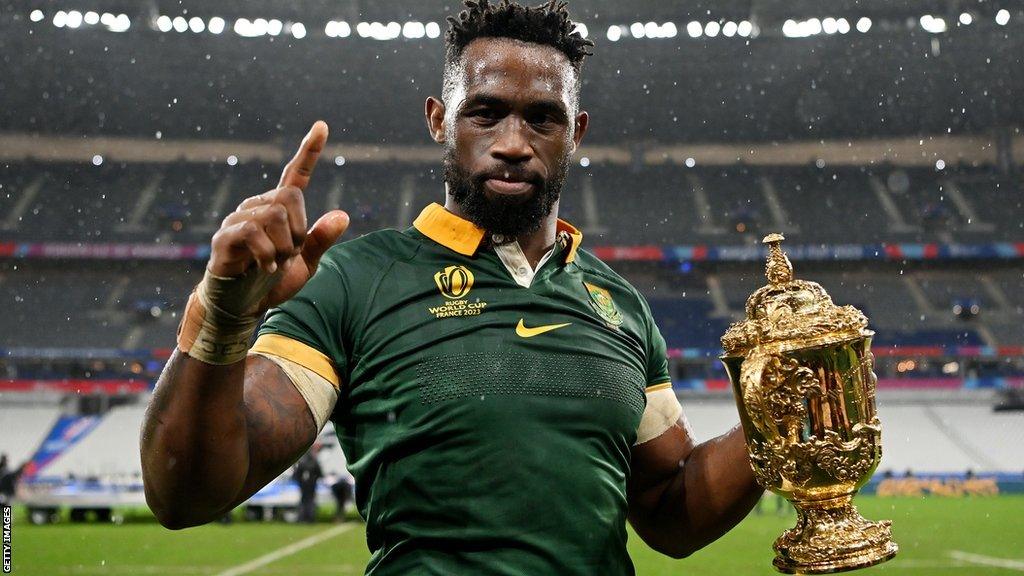Rugby World Cup 2023: Why does victory mean more to South Africa?
- Published

Huge numbers of people took to the streets in South Africa to watch the nation's rugby team beat New Zealand in the Rugby World Cup final
Having lifted the Rugby World Cup trophy, winning captain Siya Kolisi did not hide the fact that South Africa's prosperity in Paris was at odds with the reality for many people in his homeland.
The Springboks beat New Zealand 12-11 at the Stade de France on Saturday, making them the first team to win successive editions of the tournament away from home.
The first nation to win it four times, they have now won half of the eight tournaments they have taken part in, having been absent from the first two editions because of the sporting exile imposed in response to the country's apartheid government.
The Boks tasted victory on home soil on their very first appearance in 1995, with Nelson Mandela wearing a green and gold shirt and cap to celebrate on the Johannesburg pitch, reclaiming an emblem that had been used divisively during apartheid.
Mandela had become president a year earlier, when the ruling African National Congress (ANC) - which had been banned until 1990 - had taken power in South Africa's first non-racial elections and the country had been re-admitted to the sporting world, with black players allowed to join the team again.
In the aftermath of that feted triumph, expectations were high for the so-called 'Rainbow Nation' - but 29 years on, South Africa has the world's highest unemployment rate of 42% and is facing many other economic problems, including high rates of poverty and frequent power blackouts.
"The people of South Africa will tell you that there's not a lot going right in our country," said Kolisi, whose status as a symbol of hope has only grown since he became the team's first black captain a year before they won the 2019 tournament.
"South Africa is a beautiful country with a lot of problems. We care for each other, we care for our country."
'We are all in this together'
Continuing the legacy of Mandela, South Africa's current president, Cyril Ramaphosa, who assumed office four months before Kolisi became captain, was a prominent figure in the team's celebrations in Paris and clearly wants their unity to become a greater feature of society.
Rugby World Cup final highlights: Pollard kicks South Africa to victory
"We need more of this, and not just in the domain of sporting achievement," Ramaphosa said, pointing out that the number of black players in the squad had grown from one in 1995 - the legendary Chester Williams - to almost half of South Africa's players in the 2023 final.
Ramaphosa said the team showed many of the qualities which he feels will be needed to address South Africa's position as the most unequal country in the world.
"The patriotism we display in sports stadiums should be reflected in our approach to overcoming our challenges," he added, emphasising that those issues could not be "forgotten or wished away" by the "fleeting moment" of sporting victory.
"We are all in this together as government, business, labour, civil society and citizens," added Ramaphosa.
The result also aligned the president's views with those of opposition party the Democratic Alliance, whose leader, John Steenhuisen, shared a statement from the Multi-Party Charter praising the team's 'Stronger Together' motto.
"If we unite, nothing can stand in our way," they said.
Many of South Africa's vanquished opponents at the World Cup would no doubt recognise the truth of that statement.
Reflecting the Rainbow Nation
Part of the appeal of the squad to South Africans is their relatability, enhanced by what Chulumanco Macingwane, of the Gwijo Squad fan movement, calls a "rebrand" during the last five years, allowing players from impoverished upbringings to establish themselves through unconventional routes.
Winger Makazole Mapimpi, a key figure in the 2019 triumph, is among the stars Macingwane points to, describing how the diversity of backgrounds and languages in the dressing room makes the squad vividly representative of that Rainbow Nation.
"The fact that the Springboks now have a black captain is extraordinarily poetic," Macingwane told BBC Sport Africa.
"Rugby has put us on the map. It is the same as football has done for Brazil.
"Rugby unites us because it gives us a sense of common purpose - a banner that we can all get behind.
"If only more of our sporting federations understood that that is exactly what needs to happen."
Kolisi acknowledged after the final that he "couldn't have dreamt" of being on the global stage as a youngster.
"With where we come from, a lot of us shouldn't be here today," he said.
"I have my own reasons to play rugby, my own goals and ambitions. I want to look after my family and make sure I look after my community, because without them I wouldn't be here.
"Some are playing for their parents who are not with us anymore. What brings us together is our country. I can't explain it to you."
Former South Africa international Bobby Skinstad, a World Cup winner in 2007, admires the squad's willingness to act as figureheads.
"I'm not going to go on a sob story," Skinstad told BBC Radio 5 Live's Rugby Union Daily podcast.
"South Africans and rugby are inextricably linked. The Springboks represent who they are and why they are South African.
"That's the culture these guys have decided to represent, which is amazing.
"They've said, 'sure, things are tough and we can try to make them better - or we can try to represent something bigger than ourselves.' They do that very well."

Siya Kolisi, 32, is the second captain to win the Rugby World Cup back-to-back
'It gives so much hope'
Speaking to the BBC before the tournament, the man who lifted South Africa's first World Cup, Francois Pienaar, said people still remind him "on a weekly basis" of the importance of that maiden victory in 1995.
The 56-year-old hears "stories from people in the townships that didn't like rugby, stood against it [but] started following the game".
But like others, he remains disappointed by the direction the country has taken.
"The hope has not been fulfilled for many people. It's really the poor and the vulnerable that are suffering."
That is why, with trophy parades planned in major cities this week to welcome the team home, large numbers of supporters will jump at the chance to share their joy in a break from the struggles of daily life.
"Things are just not good, but you can expect a massive crowd to welcome the team when they arrive," South African journalist Mo Allie told the BBC World Service's Newsday.
"Siya Kolisi comes from a poor background, not knowing where his next meal was coming from.
"For people back home, we've got serious economic problems. We have daily power cuts.
"It just gives the country so much hope, something to celebrate.
"It's also made politicians reflect by showing that if you work together to pull in the same direction, things can happen.
"It just shows the power of sport and what it can do for a nation that is as troubled as South Africa."